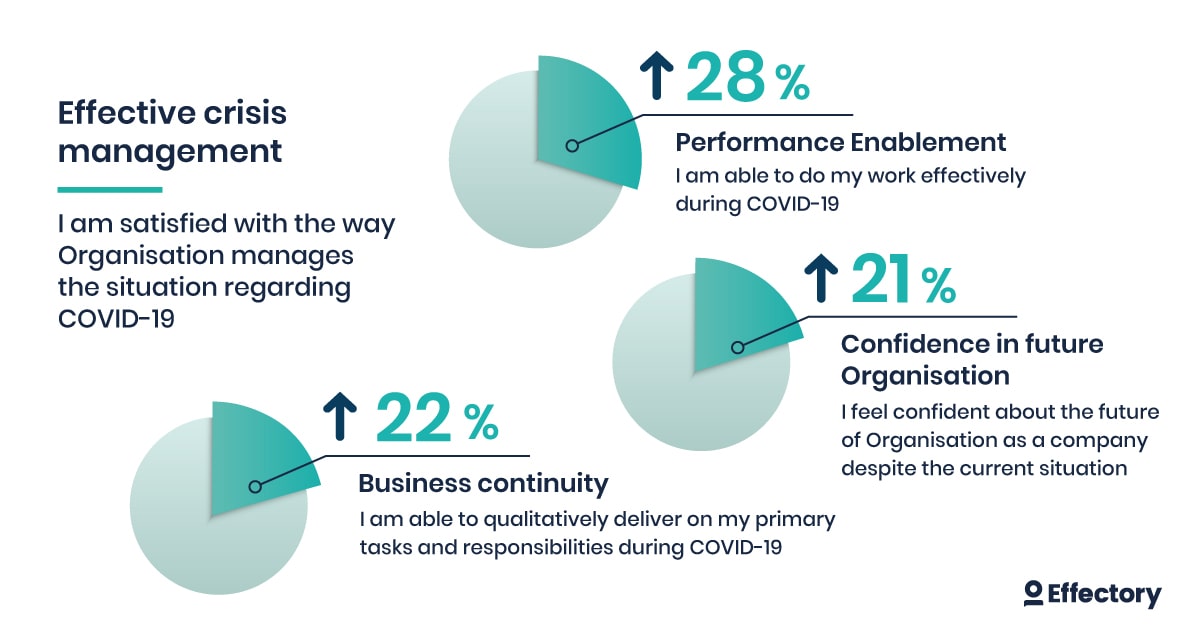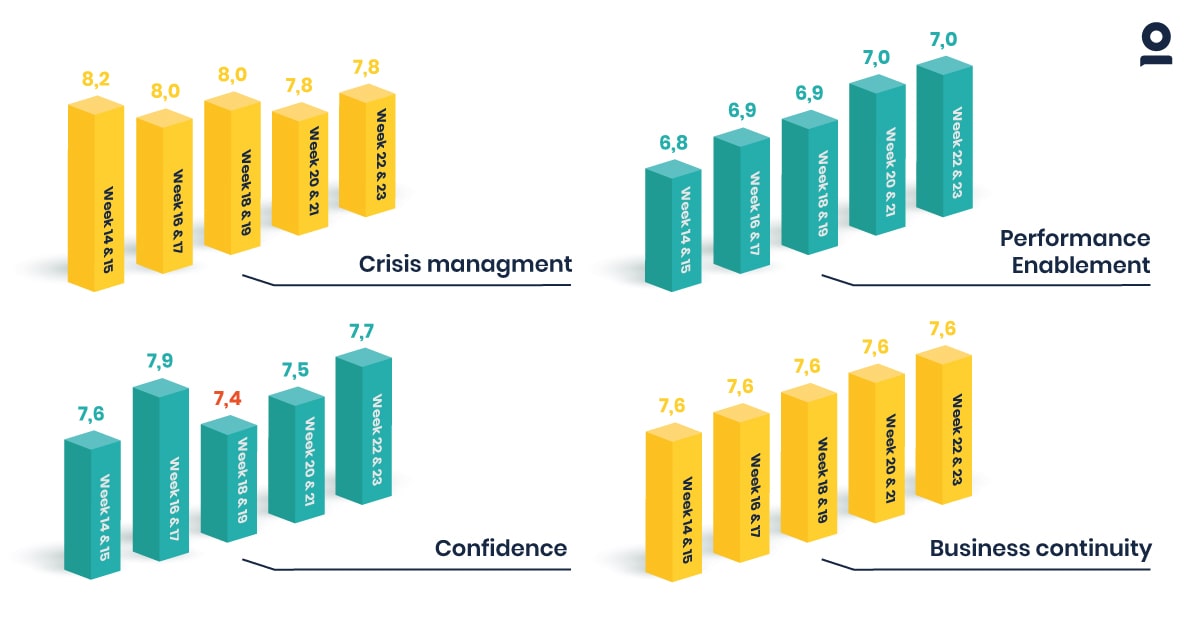Employees who are satisfied with the way in which their organization is handling the COVID-19 situation are able to perform 28 percent better, an Effectory survey of 123,000 employees across Europe has revealed.
Crisis management is essential for productivity during the coronavirus situation

What lessons can we learn from employee experiences during the first wave of coronavirus cases? We share the insights provided by the 123,000 employees who responded to Effectory’s COVID-19 Workforce Pulse surveys between late March and early June 2020.
The positive effects of good crisis management
Employees who are satisfied with the way in which their organization manages crises can perform better and get more work done. They also feel more confident about the future of the organization.

“If an organization shows strong leadership in times of crisis, it can help to develop a sense of solidarity,” says Effectory’s CPO and Innovation Manager, Merel van der Lei. “Employees then think: We are going to overcome this situation. That motivates them to be committed and to perform well.”
Business continuity
Effectory’s COVID-19 Workforce Pulse surveys are a quick way for organizations to gain insight into critical indicators. Van der Lei explains: “Employees are automatically given the same seven key questions. This allows organizations to intervene quickly, if necessary.”
These questions relate to crisis management, employee performance, trust in the organization and business continuity. The surveys also include three questions about employee well-being.
Insight into the development of critical indicators
“Carrying out Pulse surveys periodically enables organizations to detect trends,” explains Van der Lei. For example, employee confidence in the future of their organization decreased by more than 6% between mid-April and late May, before subsequently increasing again.

Respond, reflect and accelerate
To ensure that the right information is gathered at each stage, organizations are able to determine the emphasis of each Pulse survey. The ‘Respond’ question set helps organizations to stay in touch with their employees while responding to a new situation as an organization. The ‘Reflect’ question set helps organizations think about and prepare for future situations. With the ‘Accelerate’ set, organizations can ask their employees for ideas about innovative business models, new organizational structures and methods of collaboration. This can help them to become a sustainable, agile organizations.
Respond quickly: crucial for crisis management
Constant monitoring enables organizations to respond faster in new situations. Van der Lei explains: “If there is a second wave of coronavirus cases, organizations that carried out Pulse surveys this spring will probably be better prepared. The feedback from the first wave means that they already know what their employees think is important. This means that they can implement the right measures quickly.”
The road to recovery: responding to COVID-19 successfully and sustainably
Engagement has less influence on performance during a crisis
“Under normal circumstances, engaged employees perform better because the content of their work motivates them to get going,” says Baran Metin, organizational psychologist and People Analytics Researcher at Effectory. “However, the coronavirus crisis marked a major change in the way employees experience their work. It is precisely the factors which, according to Deci and Ryan’s self-determination theory, are important for ‘autonomous’ motivation, that are often present to a lesser extent when working remotely: a sense of control over your environment, a sense of belonging to that same environment and the feeling that you are making a meaningful contribution.”
As a result, good leadership (crisis management), sufficient autonomy (the right technical resources) and good cooperation with colleagues (including remotely) during the coronavirus crisis have a greater impact on employees’ enthusiasm than usual. “This shows how important it is to be aware of how remote employees experience their work and what the organization can do to improve their well-being and performance.”
Three management lessons learned from the first wave of the COVID-19 pandemic
“Engagement is nevertheless important,” says Van der Lei. “If you can keep it high as an organization, right now, you will be stronger.” This is particularly true in the longer term: “During crises, people are more willing to take on work that they would not normally be keen to do. They work because they want to help the organization and keep their job. They are also in the same boat as their colleagues. This makes it easier to accept that you are not going to enjoy your work as much for the time being. But if this situation lasts too long, motivation decreases and irritation and stress levels increase. To retain talent in-house, organizations really need to take action and re-invest in what drives people.”
Book a free demo. See our solutions in action.
Effectory is Europe’s Leading provider of Employee Listening Solutions. Schedule a product demo and discover how to enhance your employees’ engagement.
Demo request